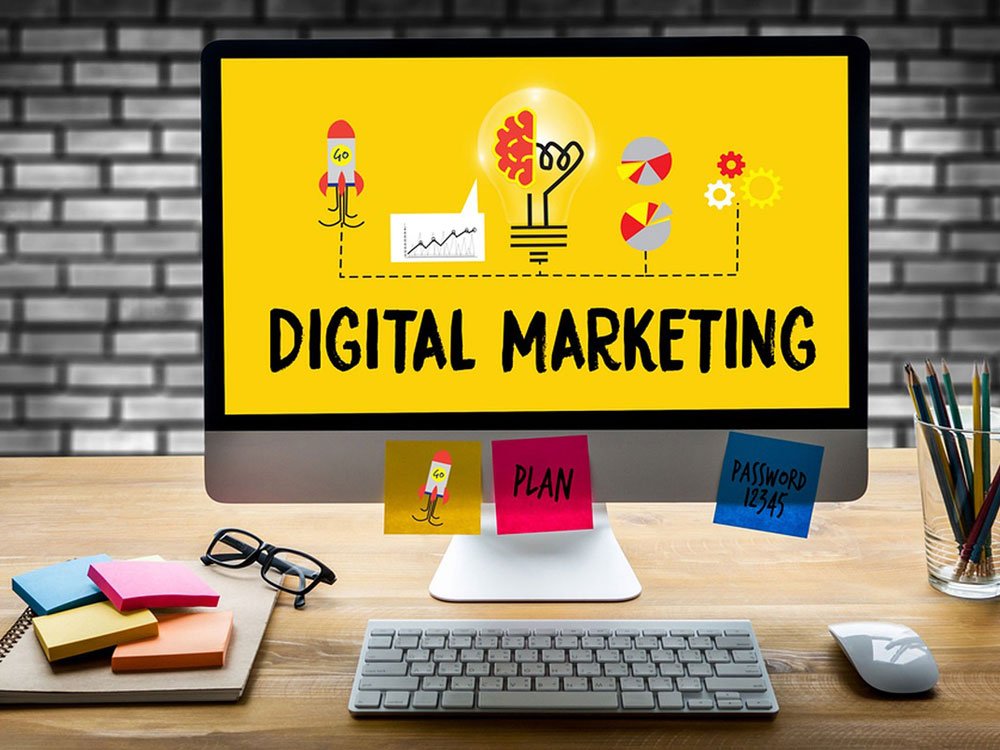
Unraveling the Essence of Online Marketing: A Comprehensive Exploration
Last updated: March 31, 2024 | Digital Techtune
Introduction:
In the dynamic landscape of commerce, online marketing stands as a pivotal force reshaping business paradigms. With the exponential growth of internet penetration and the evolution of digital technologies, online marketing has transcended conventional boundaries, becoming an indispensable tool for businesses worldwide. This essay embarks on an in-depth exploration of the multifaceted concept of online marketing, delving into its definition, components, strategies, and significance in contemporary business realms.
Defining Online Marketing:
Online marketing, often referred to as digital marketing or internet marketing, encompasses a spectrum of strategies and techniques aimed at promoting products, services, or brands through digital channels. At its core, online marketing leverages the power of the internet and digital platforms to engage with target audiences, enhance brand visibility, drive traffic, and ultimately achieve marketing objectives. Unlike traditional marketing, which relies heavily on offline mediums such as print ads, television commercials, and direct mail, online marketing harnesses the interconnectedness and interactivity of the digital realm to facilitate seamless communication and transactional processes.
Key Components of Online Marketing:
To comprehend the essence of online marketing comprehensively, it is imperative to dissect its fundamental components, each contributing to its efficacy and versatility:
Website Optimization: A well-designed, user-friendly website serves as the cornerstone of online marketing efforts. Website optimization involves enhancing various elements such as content, navigation, and loading speed to ensure a seamless user experience and improve search engine visibility.
Search Engine Optimization (SEO): SEO is a strategic approach aimed at improving a website’s visibility in search engine results pages (SERPs) organically. By optimizing content, keywords, meta tags, and backlinks, businesses can enhance their online presence, attract relevant traffic, and bolster their ranking on search engines like Google, Bing, and Yahoo.
Content Marketing: Content lies at the heart of online marketing endeavors, serving as a catalyst for engagement, lead generation, and brand storytelling. Content marketing involves creating and distributing valuable, relevant, and consistent content across various digital channels, including blogs, social media, videos, infographics, and podcasts, to attract, educate, and retain target audiences.
Social Media Marketing (SMM): With the proliferation of social networking platforms such as Facebook, Twitter, Instagram, LinkedIn, and TikTok, social media has emerged as a potent medium for online marketing. SMM entails leveraging social media channels to connect with audiences, foster relationships, amplify brand awareness, and drive conversions through targeted advertising, influencer partnerships, and organic engagement strategies.
Email Marketing: Despite the advent of newer marketing channels, email marketing remains a stalwart in the digital marketing arsenal. Email marketing involves sending personalized messages, newsletters, offers, and updates to a segmented list of subscribers with the aim of nurturing leads, retaining customers, and promoting products or services effectively.
Pay-Per-Click Advertising (PPC): PPC advertising allows businesses to bid for ad placement on search engines and other digital platforms, paying a fee only when their ad is clicked. Platforms like Google Ads and Bing Ads enable advertisers to target specific keywords, demographics, and geographical locations, ensuring maximum relevance and ROI.
Affiliate Marketing: Affiliate marketing entails partnering with third-party affiliates or publishers who promote a company’s products or services in exchange for a commission for each sale or lead generated through their referral. This performance-based marketing model fosters mutually beneficial relationships and expands the reach of businesses across diverse online channels.
Analytics and Data Insights: The cornerstone of effective online marketing lies in data-driven decision-making. Analytics tools such as Google Analytics, Adobe Analytics, and social media insights provide valuable metrics and insights into audience behavior, campaign performance, conversion rates, and ROI, enabling marketers to optimize their strategies and allocate resources judiciously.
Strategies and Tactics in Online Marketing:
In the ever-evolving landscape of online marketing, myriad strategies and tactics abound, each tailored to specific goals, target audiences, and industry verticals. Some of the prominent strategies employed by marketers include:
Search Engine Marketing (SEM): SEM encompasses paid search advertising, whereby businesses bid for ad placement on search engine results pages (SERPs) to drive traffic to their websites. Through platforms like Google Ads and Bing Ads, advertisers can target keywords relevant to their offerings, refine ad copy, and optimize bids to maximize click-through rates (CTR) and conversions.
Social Media Advertising: Social media platforms offer robust advertising solutions that enable businesses to target specific demographics, interests, and behaviors with precision. Whether through sponsored posts, carousel ads, or video ads, social media advertising empowers marketers to reach audiences at various stages of the sales funnel and drive measurable results.
Content Syndication: Content syndication involves republishing or distributing branded content across third-party websites, blogs, and online publications to amplify reach, enhance brand credibility, and attract new audiences. By partnering with reputable publishers or content networks, businesses can extend the lifespan and visibility of their content assets while tapping into new audience segments.
Influencer Marketing: Influencer marketing leverages the influence and reach of social media personalities, celebrities, or industry experts to endorse products, services, or brands to their followers. By collaborating with influencers whose values align with their brand, businesses can leverage their credibility, authenticity, and rapport with their audience to drive engagement and conversions.
Remarketing and Retargeting: Remarketing involves targeting users who have previously interacted with a website or mobile app but did not complete a desired action, such as making a purchase or filling out a form. Through the use of tracking pixels and cookies, marketers can deliver personalized ads or messages to these prospects across various digital touchpoints, nurturing them through the conversion funnel and increasing the likelihood of conversion.
Mobile Marketing: With the proliferation of smartphones and mobile devices, mobile marketing has emerged as a critical facet of online marketing strategies. From mobile-responsive websites and in-app advertisements to SMS marketing and location-based targeting, businesses can leverage mobile channels to engage with consumers on the go and deliver hyper-targeted experiences tailored to their preferences and context.
Significance and Impact of Online Marketing:
In an era characterized by digital transformation and rapid technological advancements, the significance and impact of online marketing cannot be overstated. From small businesses to multinational corporations, organizations across industries are harnessing the power of digital channels to connect with consumers, drive sales, and build lasting relationships. The following extended analysis delves deeper into the multifaceted significance and profound impact of online marketing in contemporary business landscapes:
Global Reach and Accessibility: Online marketing transcends geographical boundaries, enabling businesses to reach audiences across the globe with unprecedented ease and efficiency. Unlike traditional marketing methods constrained by physical limitations, digital platforms such as websites, social media, and search engines provide a global stage for brands to showcase their products and services. Whether it’s a local artisan crafting handmade goods or a multinational corporation launching a new product line, online marketing offers equal opportunities for businesses of all sizes to expand their reach and tap into new markets.
Moreover, the accessibility of online marketing channels ensures that businesses can engage with consumers 24/7, irrespective of time zones or geographical locations. This round-the-clock availability not only enhances convenience for customers but also allows businesses to capitalize on emerging trends, respond to inquiries promptly, and capitalize on sales opportunities in real-time. As a result, online marketing empowers businesses to establish a ubiquitous presence in the digital realm and foster meaningful connections with audiences worldwide.
Cost-Effectiveness and Measurable ROI: One of the defining characteristics of online marketing is its unparalleled cost-effectiveness and ability to deliver measurable return on investment (ROI). Unlike traditional advertising mediums such as print, radio, or television, which often require substantial upfront investments with limited visibility into performance metrics, online marketing offers granular control over expenditures and precise tracking of outcomes.
Through pay-per-click (PPC) advertising, businesses only pay when users engage with their ads, whether through clicks, impressions, or conversions, thereby minimizing wastage and maximizing cost-efficiency. Similarly, social media advertising platforms enable advertisers to set specific budgets, target audiences with pinpoint accuracy, and track key performance indicators (KPIs) such as click-through rates, conversion rates, and cost per acquisition (CPA) in real-time.
Furthermore, the wealth of analytics tools and data insights available in online marketing allows businesses to analyze campaign performance, identify areas for optimization, and refine their strategies iteratively. Whether it’s A/B testing ad creatives, refining audience targeting parameters, or optimizing landing page designs, marketers can leverage data-driven insights to continually enhance the effectiveness and efficiency of their online marketing initiatives, thereby maximizing ROI over time.
Personalization and Targeting: Online marketing enables businesses to deliver personalized, targeted experiences to individual consumers based on their preferences, behaviors, and demographics. Through advanced data analytics, segmentation, and automation, marketers can tailor content, offers, and communications to resonate with each customer, fostering deeper engagement, loyalty, and advocacy.
For instance, e-commerce platforms leverage browsing history, purchase patterns, and demographic data to recommend personalized product recommendations to shoppers, enhancing the relevance and effectiveness of their marketing efforts. Similarly, email marketing campaigns can be segmented based on user preferences, past interactions, or lifecycle stages, enabling businesses to deliver highly relevant and timely messages that drive conversions and nurture long-term relationships.
Moreover, advancements in artificial intelligence (AI) and machine learning algorithms have empowered marketers to deploy predictive analytics and behavioral targeting techniques, enabling them to anticipate consumer needs, preferences, and intent with unprecedented accuracy. By leveraging predictive modeling and recommendation engines, businesses can deliver hyper-targeted content and offers that resonate with individual customers, thereby enhancing engagement, satisfaction, and brand loyalty.
Real-Time Engagement and Feedback: Unlike traditional marketing channels characterized by one-way communication and delayed feedback loops, online marketing facilitates real-time interaction and dialogue between brands and consumers. Whether it’s through social media engagement, live chat support, or interactive content experiences, businesses can engage with customers in meaningful conversations, address their inquiries promptly, and provide personalized assistance throughout their purchasing journey.
Additionally, online marketing channels provide rich sources of data and feedback that enable businesses to gain valuable insights into consumer preferences, sentiments, and behaviors. Social media listening tools, sentiment analysis algorithms, and customer feedback mechanisms allow marketers to monitor brand mentions, sentiment trends, and customer satisfaction levels in real-time, enabling them to adapt their strategies and messaging accordingly.
Furthermore, the interactive nature of online marketing fosters a sense of community and belonging among consumers, driving brand advocacy, user-generated content, and word-of-mouth referrals. By cultivating authentic relationships with customers and actively engaging with their feedback and contributions, businesses can foster brand ambassadors who champion their products and services, amplifying their reach and influence within their social circles.
Agility and Adaptability: In today’s fast-paced digital landscape, consumer preferences, market dynamics, and technological trends are constantly evolving. Online marketing provides businesses with the agility and adaptability to respond to these changes swiftly and effectively, ensuring that they remain competitive and relevant in an ever-changing environment.
Whether it’s launching targeted campaigns to capitalize on seasonal trends, pivoting messaging strategies in response to market shifts, or adopting emerging technologies to enhance customer experiences, online marketing enables businesses to iterate rapidly and experiment with new approaches without being beholden to long production cycles or logistical constraints.
Furthermore, the inherently data-driven nature of online marketing empowers businesses to make informed decisions based on real-time insights and empirical evidence, rather than relying on intuition or conjecture. By monitoring key performance indicators, analyzing market trends, and benchmarking against industry benchmarks, marketers can identify opportunities, mitigate risks, and optimize their strategies proactively, thereby maintaining a competitive edge in an increasingly crowded marketplace.
Conclusion:
In conclusion, online marketing stands as a transformative force reshaping the way businesses engage with consumers, drive sales, and build brand loyalty in the digital age. Through its global reach, cost-effectiveness, personalization, real-time engagement, and agility, online marketing offers unparalleled opportunities for businesses to connect with audiences worldwide, deliver personalized experiences, and adapt to evolving market dynamics. As technology continues to evolve and consumer behaviors evolve, the significance and impact of online marketing are poised to grow exponentially, empowering businesses to thrive in an increasingly interconnected and competitive landscape.

